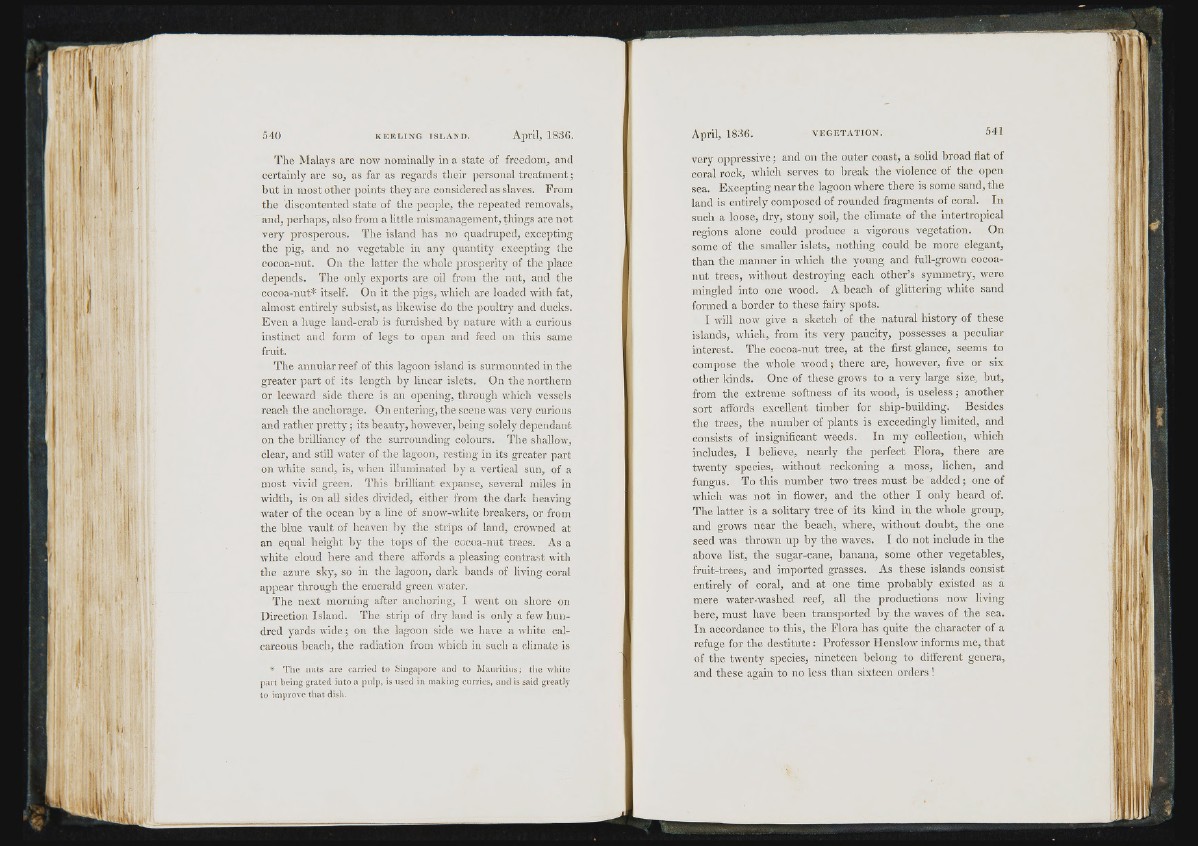
■iri m .
(T '.' I
il
Hil
The Malays are now nominally in a state of freedom, and
certainly are so, as far as regards their personal treatment;
but in most other points they are considered as slaves. From
the discontented state of the people, the repeated removals,
and, jierhaps, also from a little mismanagement, things are not
very prosperous. The island has no quadruped, excepting
the pig, aud no vegetable in any quantity excepting ihe
cocoa-nut. On the latter the whole prosperity of the place
depends. The only exports are oil from the nut, and the
cocoa-nut* itself. On it the pigs, which are loaded with fat,
almost entirely subsist, as likewise do the poultry and ducks.
Even a huge land-crab is furnished by nature with a curious
instinct and form of legs to open and feed on this same
fruit.
The annular reef of this lagoon island is surmounted in the
greater part of its length by linear islets. On the northern
or leeward side there is an opening, through which vessels
reach the anchorage. On entering, the scene was very curious
and rather pretty; its beauty, however, being solely dependant
on the brilliancy of the surrounding colours. The shallow,
clear, and still water of the lagoon, resting in its greater part
on white sand, is, when illuminated by a vertical sun, of a
most vivid green. This brilliant expanse, several miles in
width, is on all sides divided, either from the dark heaving
water of the ocean hy a line of snow-white breakers, or from
the blue vault of heaven by the strips of land, crowned at
an equal height by the tops of the cocoa-nut trees. As a
white cloud here and there affords a pleasing contrast with
the azure sky, so in the lagoon, dark bands of living coral
appear through the emerald green water.
The next morning after anchoring, 1 went on shore on
Direction Island. The strip of dry land is only a few hundred
yards wide; on the lagoon side we have a white calcareous
beach, the radiation from which in such a climate is
* T lie n u ts a re c a rrie d to S in g a p o re a n d to M a u r itiu s ; th e w h ite
p a rt b e in g g ra te d in to a p u lp , is u sed in m ak in g c u rrie s , a n d is said g re a tly
to im p ro v e th a t disli.
..L
very oppressive; and on the outer coast, a solid broad flat of
coral rock, which serves to break the violence of the open
sea. Excepting near tlie lagoon where there is some sand, the
land is entirely composed of rounded fragments of coral. In
such a loose, dry, stony soil, the climate of the intertropical
regions alone could produce a vigorous vegetation. On
some of the smaller islets, nothing could be more elegant,
than the manner in which tlie young and full-grown cocoa-
nut trees, without destroying each other’s symmetry, were
mingled into one wood. A beach of glittering white sand
formed a border to these fairy spots.
I will now give a sketch of the natural liistory of these
islands, which, from its very paucity, possesses a peculiar
interest. The cocoa-nut tree, at the first glance, seems to
compose the whole wood; there are, however, five or six
other kinds. One of these grows to a very large sizq but,
from the extreme softness of its wood, is useless; another
sort affords excellent timber for ship-building. Besides
the trees, the number of plants is exceedingly limited, and
consists of insignificant weeds. In my collection, which
includes, I believe, nearly the perfect Flora, there are
twenty species, without reckoning a moss, lichen, and
fungus. To this number two trees must be added; one of
which was not in flower, and the other I only heard of.
The latter is a solitary tree of its kind in the whole group,
and grows near the beach, where, without doubt, the one
seed was thrown up by the waves. I do not include in the
above list, the sugar-cane, banana, some other vegetaliles,
fruit-trees, and imported grasses. As these islands consist
entirely of coral, and at one time probably existed as a
mere water-washed reef, all the productions now living
here, must have been transported by the waves of the sea.
In accordance to this, the Flora has quite the character of a
refuge for the destitute: Professor Henslow informs me, that
of the twenty species, nineteen belong to different genera,
and these again to no less than sixteen orders!